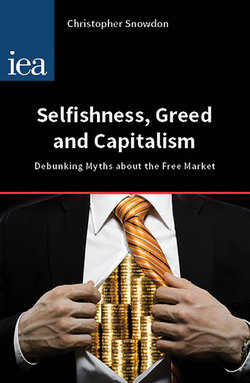Читать книгу Selfishness, Greed and Capitalism - Christopher Snowdon - Страница 14
На сайте Литреса книга снята с продажи.
Some models are useful
ОглавлениеThe statistician George E. P. Box once said that ‘all models are wrong, but some are useful’ (Box and Draper 1987: 424). Theoretical economics sometimes describes a world which no one believes exists, nor ever will exist, and yet it can still be useful. For example, economic theory suggests that, if there is perfect competition in a totally free market, prices will drop to the point at which there is no excess profit. In this scenario, a company sells a product with a ten pence profit margin and so another company jumps in and sells the same product with a nine pence profit margin. This undercutting continues until the product is sold for the exact amount it costs to manufacture, distribute and retail, including the salaries of all involved (the marginal cost of production).
This scenario is patently unrealistic, partly because government regulation precludes the possibility of free markets with total competition and no barriers to entry, but also because in a vibrant and creative economy there are always profit margins for entrepreneurs to chase. But, although the model is hypothetical to a large extent, it contains the important truth that greater competition tends to lead to lower prices. Reducing barriers to entry forces down prices and, all other things being equal, reduces profit margins. As Harris and Seldon (1959: 48) write, ‘ ‘‘perfect” competition is a figment of the imagination, although a useful one. It is still true that the less imperfect a market, and the more it approaches the “perfect” model of theory, the better results it might yield in terms of costs and prices.’
It is not necessary for a totally free market to exist for the benefits of competition to be shown empirically, nor does a fantasy world of perfect competition have to be created for the benefits of competition to be felt. And it is emphatically not the case that if one pays more than cost price for a product then ‘the whole edifice of neoliberal economics collapses’, as Richard Murphy claims (Murphy 2011: 45).6 How different this is from state socialism in which the closer a country gets to the ideal of central planning, the worse the outcomes become (and how ironic that those who criticise the free market for its imperfect competition propose government monopoly as the solution).
To take an example from Econ 101, a model which assumes that lower prices will lead to more sales is useful, not because the outcome invariably follows the intervention, but because it will tend to do so, has been shown to do so and there are common sense reasons why it should do so. Similarly, a model which assumes that people make rational, self-interested decisions is useful, not because people invariably do so, but because most people try to do so, and frequently succeed in doing so, most of the time. Rational man, or homo economicus, ‘is not only a simplification of man, as all models will be, but he is also a caricature for he epitomises to an extreme degree the essential characteristics of economic behaviour’ (Morgan 1996: 20). So long as the caricature represents a fundamental truth about how people tend to behave, the model is useful.
6 Economists ‘assume that every business sells every product it makes at what is called the marginal cost of production. That means all they want back for the product they sell is the precise cost they incur for making the precise item they have sold. So if they sold you, for example, an MP3 download then they not only should but must, if this model of utopia described by neoliberal economists is to work, charge you just exactly what it cost them to make the MP3 download they sold to you. I kid you not: the whole edifice of neoliberal economics and the mantra so often repeated that business is more efficient than government is based on this type of logic.’ (Murphy 2011: 44–45).
